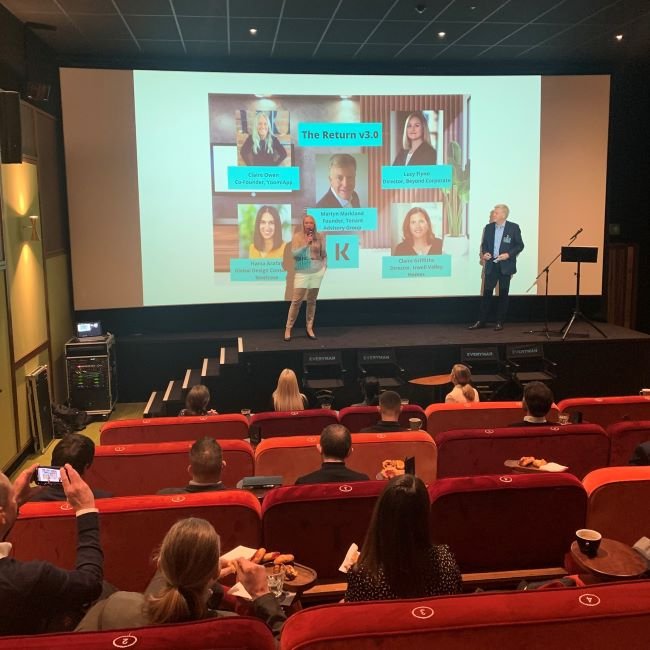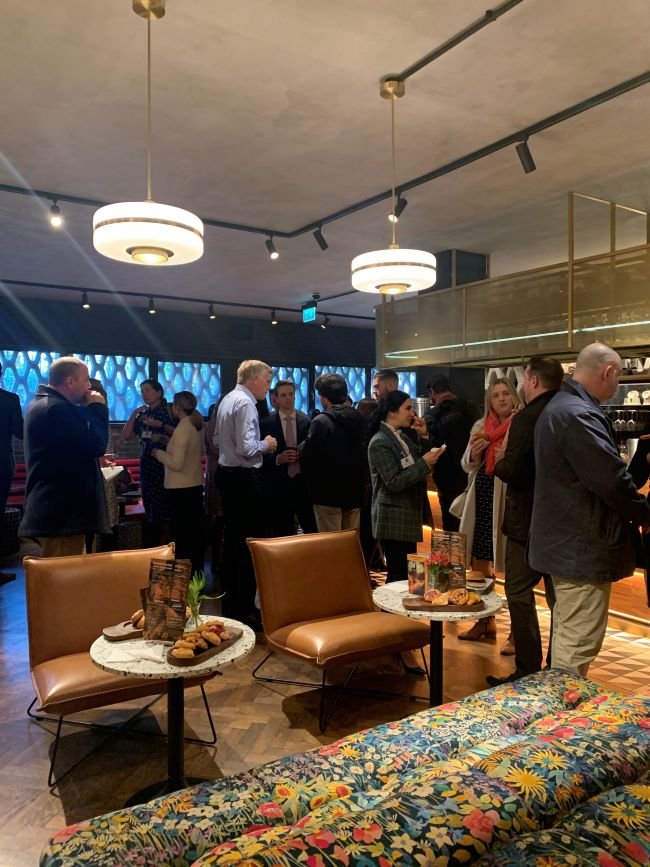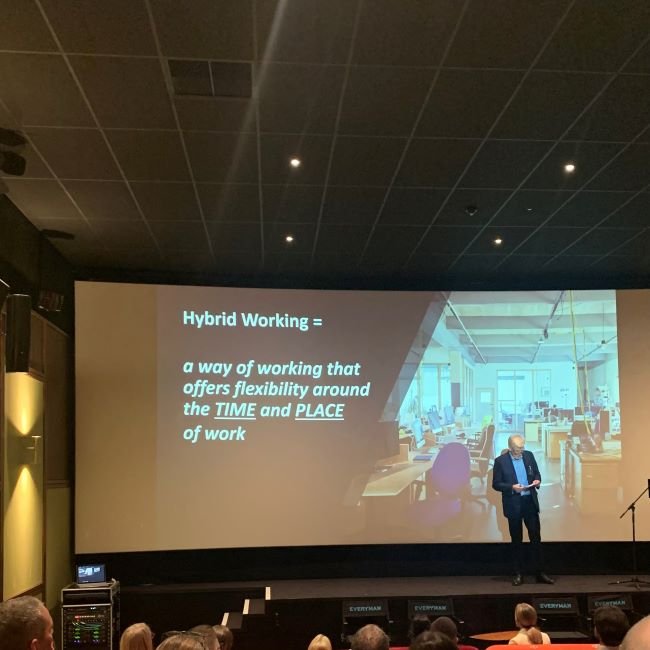On 16 March 2020, Boris Johnson announced that “now is the time for everyone to stop non-essential contact and travel”. Exactly 2 years on and three national Lockdowns later, what does the future of work look like?
I have spent the last 30 years tracking the progress of remote or hybrid working as it is now termed. So when I was asked to moderate a seminar on the subject, I jumped at the opportunity.
The event was entitled ‘The Return v3.0’ and was held at the Everyman St Johns cinema in Manchester on 17 March 2022. The organisation hosting the event was the North West entrepreneur networking group known as the K-Club.
We invited 4 speakers to present including one of TAG’s long standing clients, Irwell Valley Homes. The presentations were followed by a panel discussion involving questions from the audience.
The speakers covered topics ranging from emerging technologies to the latest legal advice. We got to hear from one of the world’s leading manufacturers of office environments as well as a recent adopter of hybrid working.
Topics and Speaker Line Up
Technology: How can technology help overcome the challenges of hybrid working?
Claire Owen, Joint Founder YoomiApp
Legal/HR: How is hybrid working changing the relationship between employer and employee and what should employers be doing about it?
Lucy Flynn, Director, Beyond Corporate
Operations: What are the major lessons learnt by an early adopter of hybrid working?
Claire Griffiths, Director, Irwell Valley Homes
Property: How is the property sector responding to the shift to hybrid working and what will the office of the future look like?
Hania Arafat, Global Design Consultant, Steelcase
Here is a round up of the key learning points from the event.
Introduction
The location in which we undertake our work is important as it affects pretty much every aspect of our society. It can impact the number and character of shops we have on our local High Street, the quality of our public transport and even the value of our home. Less obvious impacts include our mental health and our career prospects.
The term ‘Hybrid Working’ can mean different things to different people. To understand what hybrid means in practical terms the audience were asked which of the following three categories* of worker they felt they associated with most:
‘Owner’ - those who are based full-time in the office
‘Zoner’ - those that work from home, at the office and ‘third places’ (e.g.’s client office, train, coffee shop)
‘Homer’ - those that work more or less exclusively from home
*these terms were developed by Unispace which is a global workplace design consultancy.
According to a Business Survey carried out by the Daily Telegraph on 7 March 2022, the UK currently has more or less equal numbers of workers in each category. Of course, that could change over time.
So what did our speakers think the impacts of hybrid working will be?
Here is a summary of the main “takeaways” from each speaker’s presentation.
Technology (Claire Owen, Yoomi App)
Claire explained the role that tech can play in overcoming some of the challenges posed by remote or hybrid working. She used her company’s new app as an example.
She demonstrated that tech can be used to address two major challenges of remote working namely, employee engagement and line management. The great benefits of technology include the simplification of process and the generation of real time data.
In the case of the Yoomi app, imoji’s provide a simple and effective mechanism for staff to explain how they are feeling about their productivity and general wellbeing. The data that is generated allows line managers to react to issues in real time. This makes them far more effective than before. It also makes staff feel connected and valued by the organisation.
Legal/HR (Lucy Flynn, Beyond Corporate)
Lucy Flynn’s presentation left the audience in no doubt that employers have a major challenge on their hands if they want employees to return to the office full time.
She explained that the right for UK staff to request flexible working has been around since 2003 and that the effectiveness of home working over the last 2 years has made it significantly harder for employers to deny such a request.
She concluded that if employers push too hard for staff to return to the office, staff are likely to do one of two things. Either leave to join a business that offers hybrid working or make a formal request for flexible working. The latter could create a damaging precedent for all staff within the company. Her advice is to adopt a consensual approach based on persuasion rather than coercion.
Operations (Claire Griffiths, Irwell Homes)
Claire Griffiths outlined the journey that her organisation had been on for two years before the pandemic hit and what had been learned as a result.
She explained that the meaning of hybrid definitely varied from one employee to another and that the adoption of new ways of working relied on being sensitive to this and the fact that there is a very real risk that resentment can creep in between different groups of staff.
Claire also highlighted the need to continually evolve the physical office space which in Irwell Valley’s case acts very much as a hub for social interaction and collaboration.
It was striking that she said the main benefits of the move to hybrid were related to the physical aspects of their new office environment. The move to the state of the art Soapworks development in Salford Quays had only been possible by the savings that had been realised by reducing the organisation’s office footprint by over 50%.
The benefits she cited included an ability to attract and retain better quality talent, increased collaboration both within and between teams and a more positive work culture where personal accountability had become far more the norm.
Property (Hania Arafat, Steelcase)
Hania described how hybrid was revolutionizing the layout of an office and how the old 80/20 rule was being turned on its head. In other words, instead of having roughly 20% of the office dedicated to meeting rooms and break out areas and the rest given over to uniform rows of desks arranged in open plan, in the future offices could have 80% of space dedicated to socializing and meeting spaces and just 20% to traditional desking.
This dramatic change in the physical arrangement reflects a shift in the function of the office from being an ‘information factory’ to a space in which collaboration, innovation and socialization are the priority.
If you would like to learn more about hybrid working and how to formulate a property strategy around it, please call Martyn Markland on 0161 457 1422 or email him at mm@tenantag.co.uk









